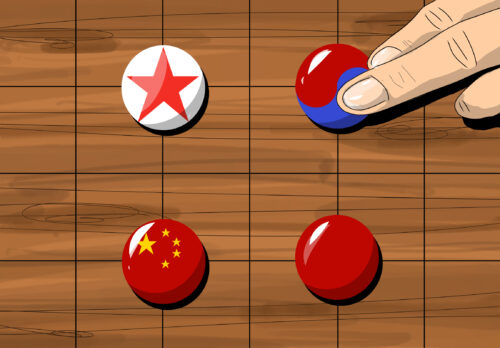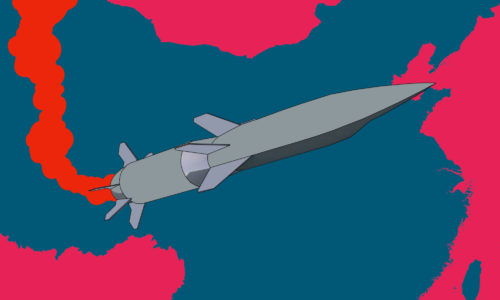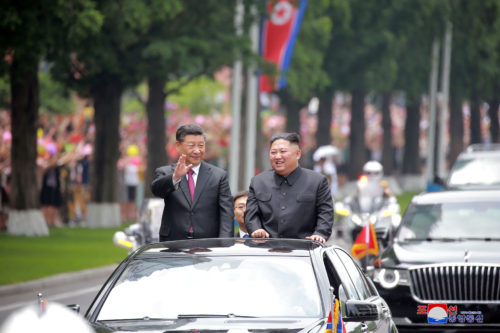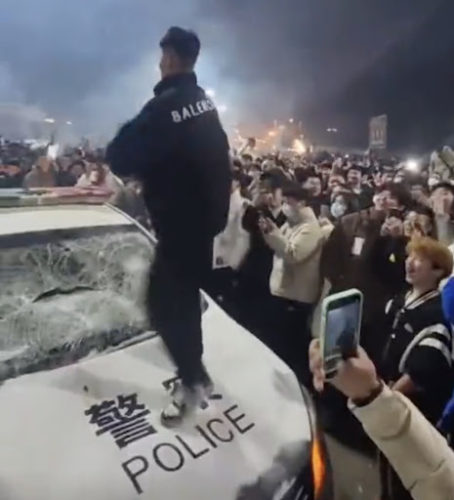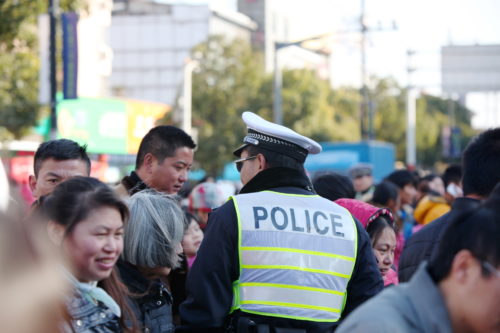A grisly murder by a literary police chief
A roundup of the top China news for May 26, 2017. Get this free daily digest delivered to your inbox by signing up at supchina.com/subscribe.

Note: The U.S. will be celebrating Memorial Day on Monday, May 29. The China Project is taking the day off. We’ll be back May 30.
Novel-writing police chief executed for grisly murder
Reuters reports that authorities executed Zhao Liping (赵黎平), the “former police chief of the northern region of Inner Mongolia, after convicting him of murder, bribery, and possession of firearms and explosives.” In 2016, overseas Chinese news and gossip site Wenxue City reported (in Chinese) that Zhao was the first senior official to be guilty of personally murdering someone with his own hands since 1949. There is some debate on the Chinese internet about the true story of Zhao’s crimes, but the broadly accepted facts seem to be:
- Zhao Liping was called the “cultured cadre” by his colleagues in the Inner Mongolian police force. He published several novels and personal essays — some under the pseudonym of Mr. Dead Tree 槁木先生 — and was a member of the Chinese Writers Association. You can read Mystery in Wangling 王陵疑案, a novel that Zhao co-authored, at this link.
- The murder victim was a 29-year-old woman surnamed Li. Media reports said that Zhao and Li had spent a night together in a five-star hotel only one kilometer away from the murder scene the day before the crime. Although some accounts say the nature of Zhao and Li’s relationship was not clear, there were widespread rumors that he was having inappropriate relationships with many of the female staff who reported to him.
- Zhao is thought to have killed Li because she had threatened to expose his corruption and crimes after an argument.
- Witnesses saw him shoot her in the street and then put her body in the trunk of his Audi. Her body was found by villagers on a nearby hillside, partly burned.
- In addition to the murder, Zhao was convicted of taking more than two million yuan ($291,700) in bribes and illegally storing 91 explosive detonators in his office.
Wikipedia has further biographical details on Zhao (in Chinese), including a list of his literary works.
Don’t expect China to tighten the squeeze on North Korea
The South China Morning Post says that “China will not support using more sanctions to further pressure North Korea into halting its nuclear weapons programme,” according to a delegation from a Beijing-based think tank that met members of the National Committee on American Foreign Policy in New York this week. The Post article notes the name of the think tank — Chinese Institutes of Contemporary International Relations (CICIR) — but does not mention that it is one of the most influential think tanks in China, with close links to the powerful Ministry of State Security and Party leadership.
The Post quotes Stephen Noerper, a former senior analyst in the U.S. Department of State who attended the meeting with CICIR, on their attitude: “They feel that China has been doing its maximum and the U.S. shouldn’t expect too much more.” Noerper added that it was not just a lack of willingness on China’s part: “The Chinese are also admitting their limited reach on this… You know, you can only do so much to rein in a nationalistic, independent-minded Pyongyang.”
In other DPRK news, Time reports that “Chinese officials have told the U.S. that they’ve tightened inspections and policing along the border with North Korea as part of UN sanctions aimed at halting Pyongyang’s nuclear and missile activities,” according to Acting Assistant Secretary of State Susan Thornton, the top U.S. diplomat for East Asia, and a previous guest on the Sinica Podcast.
Violence, overwork, and low wages: China does not have enough nurses
Caixin has published an article on the “acute shortage” of nurses in China, where there were “just over two nurses for each 1,000 patients in 2016.” The World Health Organization (WHO) standard is three nurses per 1,000 people; in Japan and the U.S., the ratio is about 11 to 1,000.
There are currently 3.5 million registered nurses in China, and government planners estimate that the country will need more “more than one million new nurses by 2020.” Tough workplace conditions make it difficult for hospitals to attract nurses:
- A survey in 2015 found that 58.7 percent of nurses “felt like quitting.”
- Caixin profiles a nurse who often works 12-hour shifts, six days a week, and “not only has to care for inpatients and assist doctors during surgery, but also urge patients to pay their medical bills on time, push cleaning staff to empty the trash bins and fix TV sets in the ward.”
- It is “common practice to add extra beds to wards with no additional support for the nursing staff.”
- Workplace violence, mostly from disgruntled patients and their families, is frequent.
—Jeremy Goldkorn, Editor-in-Chief
Kaiser Kuo: America should stop sneering at China’s Belt and Road initiative
The Sinica Podcast co-host writes his latest commentary piece for The China Project, which explores the so-called “Kindleberger Trap” that the U.S. may fall into when it reflexively antagonizes China over large-scale infrastructure projects.
Viral video Friday
Jia Guo presents videos that went viral in China, May 22–26, including a controversial commencement speech and a sea lion attack.
This week on The China Project:
- Sinica Podcast: Reporting on Trump as a member of Chinese media
- Video: The sharing everything economy
- Video: Women and China conference in photos
- WeiWatch, May 16–23
- Women and China: The The China Project Forum
This week’s news roundups are:
- May 22: Did China kill C.I.A. spies? Plus: Chinese views on Iran
- May 23: Does India have more people than China?
- May 24: Gay marriage to be legal in Taiwan
- May 25: Tony Blair’s private planes and Guo Wengui
This issue of the The China Project newsletter was produced by Sky Canaves, Lucas Niewenhuis, Jia Guo, and Jiayun Feng. More China stories worth your time are curated below, with the most important ones at the top of each section.
BUSINESS AND TECHNOLOGY:
Electric vehicles now 1.2 percent of car market in China
There is news every day in China on the disruptions caused by — and the difficulties of implementing — technologies such as clean energy and smartphone-enabled bike-sharing services. Here are four from this week:
- Clean Technica reports that China “had more than 32,000 new electric cars zooming the streets last month, a 49% increase over the same month last year.” Electric vehicles made up 1.2 percent of all cars sold in April. The five top-selling models were from BAIC, Zhidou, Kandi, Geely, and BYD.
- Germany’s Volkswagen and Anhui Jianghuai Automobile Group (JAC Motor) have received approval from regulators to form a joint venture to “build 100,000 pure battery electric vehicles annually,” according to Reuters.
- CGTN reports on efforts to turn Beijing’s taxi fleet electric, with a video featuring a disgruntled driver saying “No way!” when asked if he wanted to continue driving an electric vehicle after trying it for three months. Many drivers like him find the charging stations too sparse and charging too time-consuming, but that may soon change: China’s goal is to have 5 million charging stations installed in the country by 2020, and 80 million by 2030. Furthermore, some stations are already experimenting with new methods for changing electric taxi batteries, such as swapping out depleted ones for freshly charged battery units in a mere five minutes, rather than charging at the site, which takes at least 90 minutes.
- Despite the renewed enthusiasm for cycling in Chinese cities caused by the booming bike-share business, Bloomberg reports on the woes of China’s large bicycle producers. Many of the established bike manufacturers were “latecomers” to the booming bike rental market, as they are “more cautious than small, private makers and take a much longer time to make decisions.” The bikes preferred by rental companies are cheap, meaning small revenue and little profit for manufacturers, but some companies now hope that the renewed enthusiasm for biking will lead to more sales of high-end vehicles in the longer term.
- China’s reforms not enough to arrest mounting debt: Moody’s / Reuters
- Irritation with Moody’s reflects China’s sensitivity as it seeks foreign investors / Reuters
- China’s hand-of-state tightens grip on market with yuan move / Bloomberg
- ‘Plant factories’ churn out clean food in China’s dirty cities / Bloomberg
- Forget New York or San Francisco, Chinese investors are looking at balmy, and cheaper, Miami / CNBC
POLITICS AND CURRENT AFFAIRS:
Phuc, Trump, and geopolitical stabilization in the South China Sea
Vietnamese Prime Minister Nguyen Xuan Phuc is scheduled to meet Donald Trump next week, and Reuters says, “Vietnam could hardly have asked for more: a U.S. warship challenging Chinese claims in the South China Sea, a meeting at the White House and six new coastal patrol boats.”
The six patrol boats that the U.S. just delivered to Vietnam were built by the Louisiana-based shipbuilder Metal Shark, and were ceremonially handed over by U.S. Ambassador Ted Osius to the Vietnam Coast Guard on May 22. According to Maritime Executive, the U.S. Coast Guard also “transferred a high-endurance cutter, USCGC Morgenthau, to the Vietnam Coast Guard during a ceremony in Honolulu” on May 25.
The South China Morning Post speculates that during the White House visit, “Phuc’s focus will likely be on the South China Sea and trade,” but that it’s possible that he “won’t ask for direct help with China,” as Vietnam “has managed some geopolitical stabilization on its own of late,” including various successful high-level meetings and mutual promotion of “their ‘comradely ties’ in their respective state media.”
In related news, possibly in response to the U.S. Navy’s maneuvering to challenge China’s South China Sea claims, ABC reports, “Two Chinese J-10 fighter jets came within several hundred feet of a U.S. Navy P-3 Orion over the South China Sea” on May 25, which American officials called “unsafe and unprofessional.”
- A provincial shuffle shows the power of China’s president / The Economist (paywall)
“The scale of his recent shake-up [of Party secretaries and governors] has been unusual. Between January 2006 and May 2007 — the comparable midway period in the rule of his predecessor, Hu Jintao — 12 party secretaries and 11 governors were replaced, only half the number shifted during the past 16 months.” - Opinion: Rethinking the next China / Project Syndicate
Stephen S. Roach, former chairman of Morgan Stanley Asia, teaches a course on “The Next China” at Yale. He writes, “The Next China is shaping up to be more outwardly focused, more assertive, and more power-centric than I envisioned when I started teaching this course in 2010. At the same time, there appears to be less commitment to a market-based reform agenda featuring private consumption and SOE restructuring.” - China police arrest 44 in $140 million online scam / Reuters
“China’s police have arrested 44 people over a scam that saw as many as 93,000 people contribute start-up capital to ‘unfreeze’ assets smuggled overseas when the Nationalist government was overthrown in 1949.” - China activists fear increased surveillance with new security law / Reuters
SOCIETY AND CULTURE:
Journalism professor’s resignation note goes viral
On May 25, Xia Qiong 夏琼, who served as head of Journalism at the School of Journalism and Communication at Wuhan University for 12 years, posted a resignation letter on her WeChat Moments social media feed. The letter was circulated and discussed widely on the Chinese internet. Xia wrote: “During my 12 years serving as the head, I accomplished nothing and made no contributions to the school.” She added: “I asked for the school’s approval of my resignation.”
In a later post, Xia further stated: “After fighting for years against a flawed higher-education administration system that has no respect for teaching, tramples on teachers’ dignity, and undervalues students’ intelligence, I eventually realized that all my efforts are meaningless and of no value… It’s extremely difficult to be a dedicated teacher.”
In an interview (in Chinese) with the Beijing News, Xia also said that in the current teacher evaluation system, publishing a paper in a journal far outweighs teaching a good course, and that “publishing in journals has become an industrial chain.”
On the Chinese social media platform Weibo, Xia’s decision was applauded (in Chinese) by many internet users. “I admire teachers like Xia. Higher education in China is dead due to the strict administration system, especially for sensitive subjects such as journalism,” one commenter wrote.
- Language brouhaha overshadows champ’s loss to machine at game of Go / Caixin
“A lofty man-versus-machine debate gave way to more earthly matters of nationalism and cultural pride on Friday, as controversy erupted over a Chinese reporter’s use of English to question a master compatriot who had just fallen to a computer at the ancient game of Go.” - Video: Shock, then acceptance: Three Chinese mothers talk about their children coming out / Sixth Tone
- Chinese FA imposes 100 percent tax on Super League clubs signing foreign players / Bleacher Report
- After ‘Dangal,’ Indian films wrestle for space in China / Mint
- Chinese aircraft cleaners retrieve US$44,000 diamond ring dropped in toilet / SCMP

